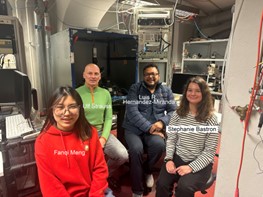CCHS Research
The CCHS Network partners with CCHS Clinical Centers of Excellence, CCHS research laboratories, respiratory and pharmacological companies, and other CCHS patient organizations to champion research initiatives that will improve patient health outcomes. Learn more about our CCHS Grant Awards.
The CCHS Network relies on the CCHS Research Advisory Board to assess research quality. This board is comprised of CCHS family members who are medical professionals and CCHS clinical specialists. They apply an NIH criteria when judging research excellence.
The CCHS Foundation and the CCHS Research Advisory Board are both subsidiaries of the CCHS Network. Please visit our website at cchsnetwork.org for more information.
CCHS Network One World (NOW) Registry
In the 2016 the CCHS Network was chosen, after a competitive selection process, to partner with the National Organization of Rare Disorders (NORD), to develop a Natural History Study of CCHS. The goal of this registry is to expand the current knowledge of the syndrome, as well as to aid medical professionals and researchers in the identification of important aspects and treatment of CCHS. Please contact the CCHS NOW Registry for more information about this work and how to join this important project.
NTS Phox2b Neurons in Chemosensory Processing and Interoceptive Pathways

Dr. Peng Li, Ph.D., Research Assistant Professor, U-M Life Sciences Institute | Assistant Professor of Biologic and Materials Sciences & Prosthodontics, U-M School of Dentistry | Assistant Professor of Molecular and Integrative Physiology, U-M Medical School
Congenital Central Hypoventilation Syndrome (CCHS) is a rare disorder caused by mutations in the Phox2b gene, which disrupts the brain’s ability to control breathing, especially during sleep. People with CCHS often experience life-threatening pauses in breathing, low oxygen levels, and other breathing difficulties. While research has highlighted the role of Phox2b in the retrotrapezoid nucleus (RTN), findings suggest the RTN alone cannot fully explain this condition. Emerging evidence indicates that the nucleus of the solitary tract (NTS), another brainstem center that contains Phox2b neurons, plays a critical role in regulating breathing by processing signals from the body and the brain. Our recent studies revealed that NTS neurons comprise diverse subsets, each playing distinct roles in regulating breathing behaviors, such as responding to low oxygen or other breathing challenges. This project aims to uncover how NTS Phox2b neurons work and how they receive signals to control breathing. Our findings could lead to better understanding and new treatments for CCHS and related breathing disorders.
$75,000/1 year
Determination of Medullary Neurons Underlying Congenital Hypoventilation

Dr. Luis Hernandez-Miranda, Ph.D., Principal Investigator
Institut für Zell und Neurobiologie Charite Universitätsmedizin Berlin
Dr. Ulf Strauss. M.D., Principal Investigator
Institut für Zell und Neurobiologie Charite Universitätsmedizin Berlin
Luis R. Hernandez-Miranda and Ulf Strauss team up to investigate the functional relevance of a molecularly defined neuron type (called dB2) in congenital central hypoventilation syndrome (CCHS).
CCHS (Congenital Central Hypoventilation Syndrome) is a rare but serious breathing disorder that is usually diagnosed in newborns. Babies with this condition have difficulty breathing properly, especially during sleep, because their bodies don’t respond well to changes in oxygen or carbon dioxide levels. This happens because the brain’s breathing control centers don’t work as they should.
The condition is linked to mutations in two important genes, PHOX2B and LBX1, but we still don’t fully understand which specific brain neurons are affected by these mutations. Recent research has identified a group of brain cells called dB2 neurons in a part of the brain responsible for controlling breathing. These neurons co-express both PHOX2B and LBX1. When PHOX2B or LBX1 genes are mutated, these neurons change in ways that might explain the breathing problems seen in CCHS, according to studies in mice. However, we don’t yet know exactly how these neurons connect to the larger breathing control system in the brain.
This project aims to learn more about what makes dB2 neurons unique, how they work within the breathing control system, and how the PHOX2B and LBX1 genes influence their development and function.
$75,000/1 year